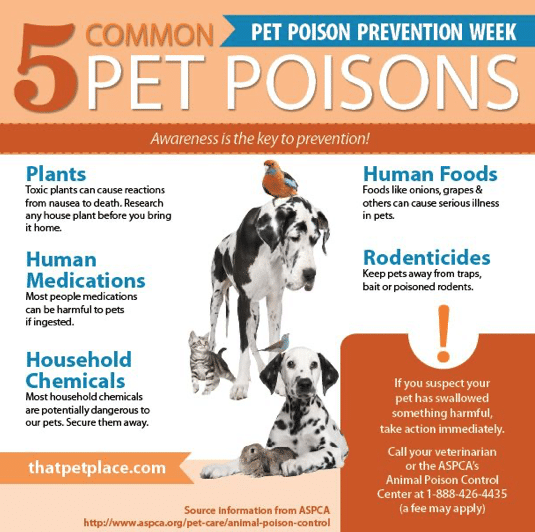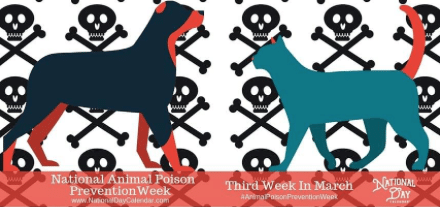From The Humane Society of Elmore County
| This is National Poison Prevention Week and while we all certainly need to be knowledgeable to protect our families, our pets also need protection from accidental poisoning. The Pet Poison Helpline is a valuable resource and below are the most common poison risks to our pets (and also to our children): 1. Over-the-counter medications such as Ibuprofen, naproxen, cold medications and herbal supplements. Make sure to keep all medications out of paws’ reach and check with a veterinarian before giving any new medication (prescription or not) to your pet. 2. Human prescription medications such as ADHD medications, antidepressants and heart medications are in many homes and need to be kept out of reach of pets.. 3. Food items and ingredients such as xylitol, grapes, raisins, onions and garlic. 4. Chocolate! Keep candy and baked goods away from your pets. 5. Veterinary products mostly due to accidental or unintentional exposures. Many pet medications are flavored so pets may mistake these for treats. Giving medicine meant for one pet to another accidentally is also possible so make sure to KNOW what you are giving your pet. And remember that a “childproof container” does not mean it is pet-proof! 6. Household items including paint, glue and cleaning products are often too easily accessible. 7. Rodenticides & Insecticides. Remember that pets, along with rodents, find baits very tasty. Rat or mouse bait ingestion can be deadly for our pets and today’s products are even deadlier than those of years ago. 8. Insecticides include items such as ant baits, bug sprays and yard products. Make sure to read all labels and keep your pets out of the affected area when using any of these products. 9. Indoor and outdoor plants, as well as bouquets, can all be sources of potential problems for pets. 10. Garden products like fertilizers, herbicides and soil enhancements can prove irresistible to a playful pet so watch your pets when you are out working on the lawn or garden. What to do if your dog or cat is poisoned? 1- Remove your pet from the area. 2- Check to make sure your pet is safe: breathing and acting normally. 3- Collect a sample of the ingested item if possible. 4- Do NOT give any home antidotes. 5- Do NOT induce vomiting without consulting a vet or Pet Poison Helpline. 6- Call the Pet Poison Helpline at 855-764-7661.If veterinary attention is necessary, contact &/or take your pet to your veterinarian or emergency veterinary clinic immediately. To help you stay up-to-date on potential pet toxins or dangers, the American Society for the Prevention of Cruelty to Animals has a handy App for your smart phone – download this app at APCC Mobile App today! |







